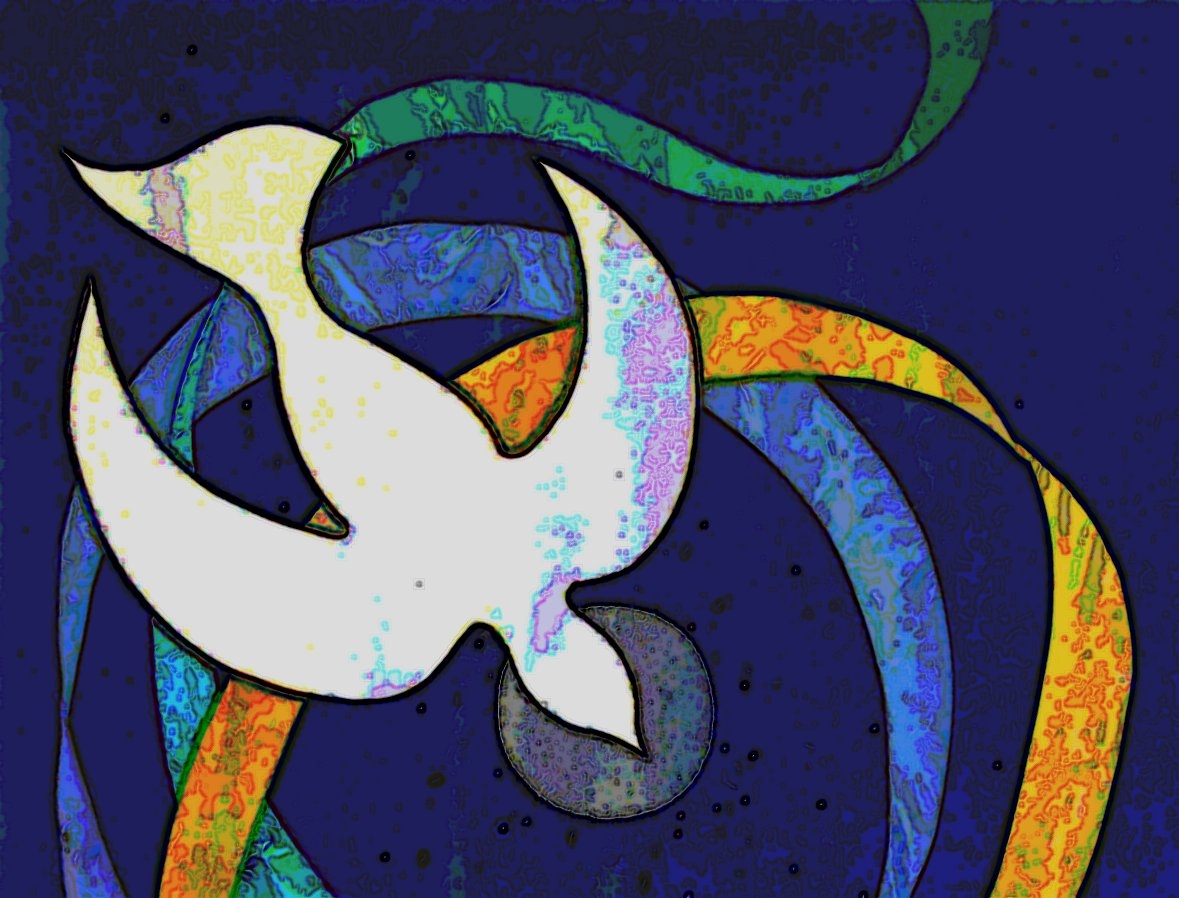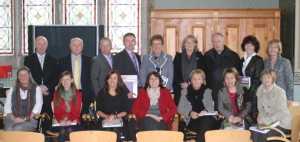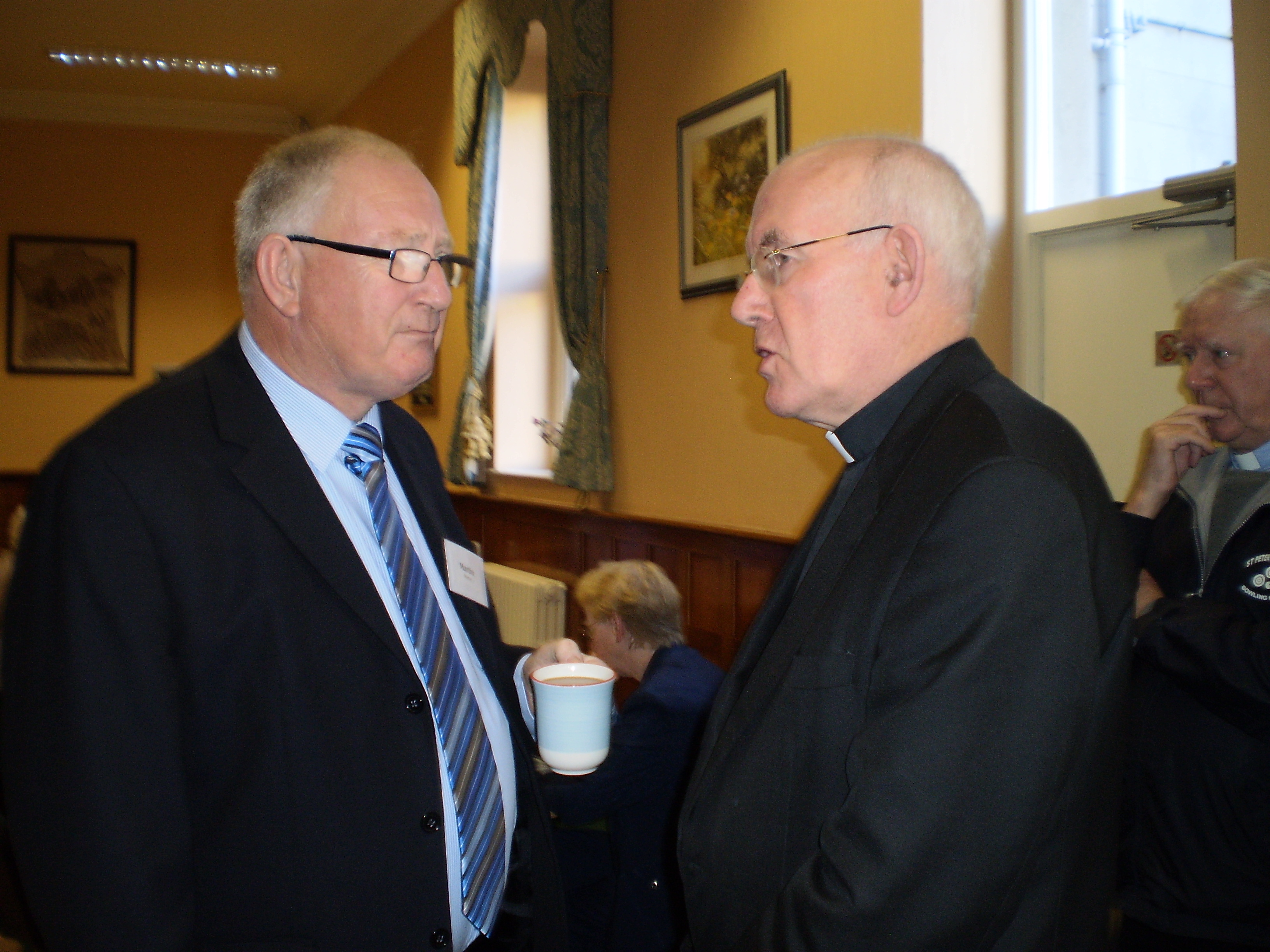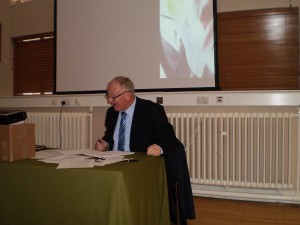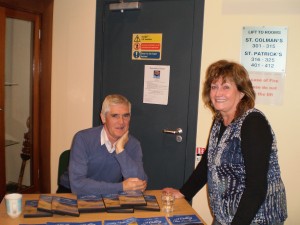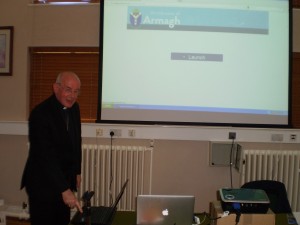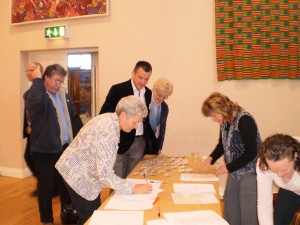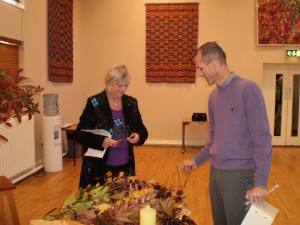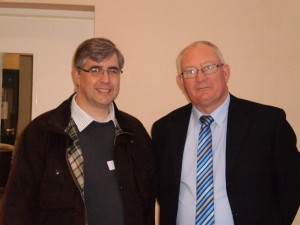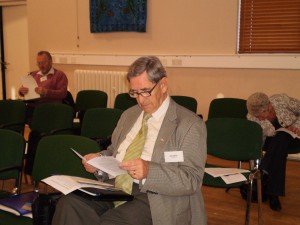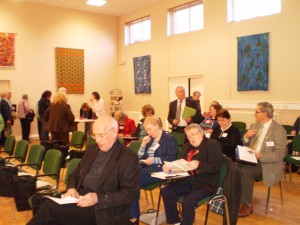What is a vocation?
The word vocation comes from the latin word “vocare” which means to call. Through our baptism as Christians, we are all called to be followers of Christ and to live the Christian values that are found in the Gospels in our daily lives. Some people choose to live this fundamental baptismal call in a special way in priesthood or religious life.
Some people respond to God’s call by working as accountants, bricklayers, nurses, teachers etc. The reality is that our career becomes our vocation when we follow it in God’s name. It may be worth reflecting on the words of Cardinal Newman
“God has created me to do some definite service, he has committed some work to me which he has not committed to another. I have my mission – I may never know it in this life, but I shall be told it in the next. I have a part in a great work; I am a link in a chain, a bond of connection between persons. He has not created me for naught. I shall do good, I shall do his work; I shall be an angel of peace, a preacher of truth in my own place, while not intending it, if I do but keep his commandments and serve him in my calling.”
To be a priest, either diocesan or missionary, is to be a spiritual leader in a community of faith. A priest gathers the people around the table of God. He opens the Word of God to his people. He is called upon and sometimes on the same day, to comfort the dying and to share in the joy of the newly married. It is a varied and challenging way of life. There are times when it can be difficult but as he works with people, a priest if often touched by the mystery and the presence of God.
What are diocesan priests?
Diocesan priests look after the day to spiritual needs of the people of a particular diocese. They work as part of a team led by the bishop who has overall responsibility for the diocese. This is a ministry which has been going on since the time of the Apostles. A diocese is the Christian community of a particular areawhich is placed under the care of a bishop There are 26 dioceses in Ireland. Most Irish dioceses were established around one of the old monastic settlements from the sixth century onwards. Some of the dioceses have double-barrrelled names, which is usually an indication that there were two dioceses, but that these have been amalgamated in more recent times. Each diocese is made up of a number of parishes. These are the local communities in which people live out their faith supported by one another and by the priests who are sent by the bishop to minister among them. Most, but not all diocesan priests are engaged in parish ministry.
What do priests do all day?
One of the characteristics of diocesan priesthood is the variety of ministry. Most priests are in parish ministry. This includes the obvious things like celebrating Masses, celebrating funerals and marriages and hearing confessions. There are many other elements in the ministry of a priest with which people may be less familiar; things like visiting the sick at home and in hospital; helping people to prepare for marriage; keeping in touch with the bereaved and with those in prison. In many parishes, the ministry of the priest includes school chaplaincy. Most parishes have a variety of groups with which the priest would have some involvement, sometimes leading, but more often just being an encouraging presence. Building community is an essential aspect of developing faith.
Do all priests work in parishes?
Apart from parish ministry, diocesan priests are also involved in a wide variety of specialised ministries; school and college chaplaincy, as well as chaplaincy to hospitals, prisons and to the defence forces are just a few more of the more obvious ones. Some diocesan priests are engaged in teaching at second or third level, or in the co ordination of services to young people, to those preparing for marriage, or to those who are marginalised whether in an urban or a rural environment.
Are there other kinds of priests?
Apart from diocesan priests, there are others who belong to religious orders or missionary societies. The religious orders (both men and women) mostly came into existence at a particular time in history, because of the vision of a particular person or group of people, who saw a particular need. They each have their own particular charism, or gift, to offer to the Church. These include contemplative monastic orders like the Cistercians or Benedictines, apostolic orders like the Franciscans and Dominicans, and orders like the Carmelites who live a mixture of active and contemplative life. The missionary societies were set up to provide for the needs of countries where the Church is relatively new, or where the Gospel is still not widely known. Many religious orders and religious societies have houses in different dioceses, and priests from these congregations have made a great contribution to parish ministry over many years. It is important to remember that that work in parishes is not the primary reason for the existence of religious congregations, and they may not always be available to work in that ministry.
What kind of free-time do you get?
In general, a priest has a day off during the week. Most priests try to take the same day each week, because it allows them to plan their work and their leisure. Once Masses are over, it is usually possible for a priest to have a good bit of free time on Sunday also. The daily routine of a priest is somewhat unpredictable, and that can sometimes make free time a bit unpredictable too. The annual holiday entitlement is three Sundays, which is usually taken to mean four weeks less one day. There is a certain give and take. We don’t clock in and out. In fact the biggest problem is priests not taking the time off they should take, because there is always something to do. Rest and recreation are an important part of being ready to do a good day’s work.
How are priests paid?
This varies quite a bit from one diocese to another, but as a general principle, the income of the priests comes directly from the contributions of the parishioners. In some dioceses, the first collection at every Sunday Mass is for the support of the priests. The income from this collection is put together with the Christmas and Easter offerings, and the offerings that are given on the occasion of weddings, baptisms and funerals. In many dioceses there is some structure put in place to ensure that a priest is not at a disadvantage because he works in a poorer parish, or in some form of non parochial ministry which doesn’t have its own direct source of income. The emphasis we find in the teaching of Jesus is on making sure that those who preach the gospel have what they need to live, and to carry out their ministry effectively. Nobody is meant to become rich by being a priest, but in general, priests are adequately and even generously provided for by their parishioners.
How long do you have to study?
The formation system is undergoing some change at present and there will be variations in the exact schedule but in most cases the normal course of preparation for priesthood is six or seven years. It seems a long time, but the years pass so quickly. This time is usually broken down into two or three years of philosophy (sometimes as part of a degree), and four years of theology. It’s not all academic study. Men preparing for priesthood are also given practical pastoral training, and helped to deepen their relationship with God. They are also helped to come to a better understanding of themselves, to value their gifts, and to accept their limitations. Many of those who opt to become priests these days already have some relevant third-level qualification. This is normally taken into account, and may slightly reduce the time of preparation.
How many points do you need to get into seminary?
The points system doesn’t apply to seminary entrance. In order to be accepted into seminary formation, an applicant is usually expected to have successfully completed the Leaving Cert/A Levels or Second Level Programme. Previous exam results are a useful indicator of a persons academic ability, but the primary consideration is that the applicant would be able to follow the course of studies without undue difficulty. The ministry of a priest has alot to do with communication, so a student for the priesthood would need to have a good standard of English. An interest in reading is a big help. If you have the necessary points for university entrance, you may be aske to do a degree as part of your formation programme. In that case, an application needs to be made to the CAO in the usual way. Applicants who have been some years out of secondary school should check to see if they can matriculate on grounds of mature age.
Northern Ireland
While the educational system in Northern Ireland is somewhat different to the Republic, the same general principles apply. Applicants should have a good basic education. Normally a pass in five GCSEs is the minimum requirement. Should he qualify for admission to a university , he will be able to study for a degree during his course of study.
Suitable candidates who have not attained the minimum requirements can be helped to reach them by special courses, and there are also colleges for mature men who lack formal education to bring them up to the required standard.
Every applicant will have specific needs and therefore it is best to discuss your educational requirements with the vocations director as soon as possible so that the appropriate arrangements can be put in place.
It is important that the level of education of priests should be on a par with that of other educated people in the parish in so far as this is possible. Candidates for the priesthood therefore, will be encouraged to acquire any further qualifications of which they are capable and which are considered necessary.
What promises do diocesan priests have to make?
Most of the promises priests make are actually made when they are ordained as deacons. This usually happens about a year before ordination to priesthood. Diocesan priests promise to live as celibates for the sake of the kingdom of heaven. In other words, they make a commitment not to marry, for the sake of their ministry, and as a sign that our ultimate fulfilment as human beings is not to be found even in the best of what this world has to offer.
Diocesan priests also promise obedience to their bishop and to his successors. In practice, this promise is not about obeying orders. The bishop is in charge, but there are very few occasions when the bishop actually tells a priest what to do. Obedience is really an attitude of generous service, and a willingness to let go of one’s own agenda. Obedience is probably experienced at its most difficult when the time comes to move from one appointment to another., for the good of the people and of the diocese.
Diocesan priests also promise to celebrate the liturgy of the hours (also known as the breviary, or the divine office) for the Church and for the world. It is part of the priest’s responsibility to pray for the people he serves.
What is a deacon?
There are three kinds of ordained ministers in the Catholic Church. The first is the bishop, who is responsible for the spiritual and pastoral care of the people of a diocese. He is assisted by priests and deacons. Traditionally deacons were ordained to preach, to assist the bishop in the celebration of the Eucharist, and to take responsibility for the Church’s ministry of charity (the care of the poor and marginalised). The first reference made to deacons in the Scriptures is found in the Acts of the Apostles, Chapter 6. AT one time, diaconate and priesthood were quite separate and distinct. At a certain stage in the Church’s history, the ministry of deacons gradually became absorbed into the ministry of priests. From that time onwards, it became the practice that men were ordained as deacons on the way to priesthood. This is known as the traditional dioaconate.
Since the Second Vatican Council, the diaconate has been restored as a distinct ministry in many countries. The process to restore the permanent diaconate in Ireland was completed in 2006. The Norms for training have been developed and over the last two years, approximately twelve men from our own diocese have been called and they have begun their formal training for this ministry.
Do diocesan priests take a vow of poverty?
Unlike members of religious orders, diocesan priests don’t take a vow of poverty. We receive an income, and we are responsible for our own expenses. This allows us a certain freedom and discretion. It would generally be regarded as inappropriate for a diocesan priest to have a lavish lifestyle , or to be amassing possessions. Our whole ministry is about helping people to place the emphasis on spiritual rather than material wealth. If our life style were to be rooted in material things, it would be a contradiction in terms.
Why are priests moved around?
There are probably two reasons why a bishop moves priests around. The most obvious one is that , when a vacancy arises in the diocese, the bishop has to consider what kind of person he needs to fill it. He will be trying to balance the gifts, the experience and the age profile of the priests in a parish or in an area. The other reason for moving a priest is that, after a certain time, most priests have given what they have to give to a particular appointment. A change, while it can be difficult, is often good for the priest and for the parish. When someone is moved (or dies or retires) that sets off a kind of chain reaction. Trying to provide priests for all the different ministries in the diocese is quite a demanding task for a bishop.
Can you be sent anywhere?
Diocesan priests are ordained to work within a particular diocese. They share in the ministry of the bishop. In principle that means that they can be given any appointment within their own diocese. There is a good deal more consultation these days than there used to be. Bishops recognise that it important to try to match a priest’s appointment to his gifts. Priests are sometimes apprehensive when they get a new appointment, especially if it involves a kind of work they have not done before. Unless there is a very good reason not to accept an appointment, the usual expectation is that a priest would give it his best shot. He can always go back to the bishop later and say “look, I’ve tried this and it’s just not working out.” In a case like that, he would usually get a chance within a few months. Some dioceses provide chaplaincy services to Irish emigrants in major cities overseas. Others have mission outreach which enables diocesan priests to spend a few years working as missionaries in Africa or Latin America.
How do you apply to become a priest?
One possibility is by having a word with a priest in your own parish. Alternatively, you can contact the diocesan vocations director. Every diocese in Ireland has a director of vocations. The Vocations Director for this diocese is Fr Peter McAnenly who is the Administrator of the Cathedral Parish, Armagh.
What happens when you apply to be a priest?
Applications generally begin as enquiries. People want information, and they want to know how to go about making the right decision. Applicants who wish to pursue their enquiry in a spirit of prayerfulness and openness to the plan of God, will be invited to take part in a discernment process , which will involve regular individual meetings with the director of vocations, usually over a period of six months or more. During this period, the director of vocations will help each candidate to arrive at a mature discernment of vocation, taking account of his personal faith journey, and his human experience.
Other possibilities offered by some dioceses include retreats, discernment groups, the opportunity to spend a few days in Maynooth or the opportunity to spend a full day with a priest as he goes about his ministry.
Once a formal application has been received, relevant documentation will be gathered, including:
Baptism and Confirmation Certificates
Certification of State examination results
Transcripts of third level courses taken, and the relevant degrees or diplomas awarded.
References will also be sought from previous employers, and from at least two other independent referees.
A psychological assessment may be used as an element of the admissions process. The assessment would have the purpose of helping to identify the human gifts and limitations which an applicant may have. If he is accepted into the formation programme, he will be helped to develop these gifts and to work around these limitations. Like every aspect of the admissions process, the report of any assessment is always treated as confidential, and would only be seen by those who are directly responsible for dealing with the application.
Arrangements will be made for the psychological assessment to be carried out by an experienced registered clinical psychologist, who has an appreciation of the church’s understanding of vocation and priesthood. The results of an assessment are discussed openly but sensitively with the applicant prior to the final interview stage of the process.
Unless the outcome of the assessment clearly excludes the applicant, the director of vocations will arrange for him to be interviewed by the bishop of the diocese or by the assessment panel, appointed by the bishop to assist him. In the final analysis, it is the bishop of the diocese who accepts a candidate into formation for the priesthood, and nominates him to the seminary. The final decision about the application rests with him.
Before the candidate is nominated to the seminary he would normally be asked to undergo a medical examination, the full results of which would be made available to him, and a synopsis of which would be sent to the director of vocations or the bishop.
What age do you have to be to become a priest?
The minimum age for ordination is 25 (although a bishop can give a dispensation to allow for ordination at 24, if he judges that to be appropriate). The majority of applications come from men between the ages of 18 and 40. People over 40 are not excluded off course, but we do need to establish that they continue to have flexibility and the energy that are necessary to begin what is not just a new career, but a whole new way of life.
Are applications from overseas accepted?
It is easy to see why someone who was born in Ireland but now lives abroad, might wish to apply to an Irish Diocese. It is not always quite as easy to see why someone who has little or no connection with Ireland would wish to do so. Before accepting into formation for the priesthood, a man who is resident outside of Ireland, a bishop or his vocations director needs to explore the applicants motivation for applying to an Irish diocese. In the normal course of events, men who apply to enter into a formation process take part in a fairly demanding process of discernment and evaluation, before they are accepted into formation. This can be difficult to arrange if the candidate is resident overseas. For all of these reasons, many bishops would prefer not to accept applications from overseas, but would suggest that a man who seriously wishes to be considered should come to live and work in Ireland for a year or two, while engaging in the discernment and admissions process. We are off course, obliged to follow the procedures which currently apply in civil law with respect to immigration and residence. Irish dioceses don’t actively seek applications from outside Ireland, because we don’t want to create the impression or the expectation that the future needs of the Church can be catered for without any commitment on the part of Irish Catholics themselves.
What are the criteria by which an application will be evaluated?
A candidate for the priesthood needs to be a person of mature (or maturing) faith, who is motivated to serve people. He needs to be a self starter, but also capable of working as part of a team. He will be reasonably intelligent and will show some signs of creative vision. Compassion and warmth will be found alongside a commitment to truth, as essential elements of his character. He has six or seven years to prepare, so readiness to learn is more important than having all the answers to life’s problems.
As basic conditions for acceptance into formation, an applicant should:
Have been a regularly practising Catholic
Have maintained or re-established for some significant time the capacity to live the virtue of chastity (ie, to live his sexuality appropriately)
Have maintained or re-established for some significant time the capacity to live without dependence on alcohol or on the use of drugs
Have a track record of working/living constructively with others
Have no record of ever having placed vulnerable people (especially children) at risk
Be emotionally stable, and free from any major psychiatric illness
Be in good general health
Why do priests not get married?
There is no short answer to the question. Celibacy is a decision not to marry, in order to be free to make a different commitment. Celibacy is all about the relationship of the priest to the people he is sent to serve. In that sense it is a positive rather than a negative decision. People sometimes think that the life of a priest is very lonely. Everyone experiences loneliness from time to time, sometimes even when they are surrounded by people. Priests are no different. But it is important to distinguish between loneliness and beign alone. Through being alone regularly, priests have more time to pray and reflect quietly, something that people with families don’t have the luxury of doing. Ministry to young couples, and families is an important part of our work. If we didn’t value marriage and relationships, this wouldn’t be the case, after all priests themselves come from families. Celibacy is also meant to have a sign value. By giving up something which most people value very highly, the celibacy of a priest reminds us all that our ultimate fulfilment is not in this world.
Do you have to be very holy to be a priest?
Technically, the word holy means set-apart, in the sense of being single minded in our relationship with God. In practice that means that we nourish our relationship with God through prayer and that we allow that relationship to influence the decisions we make. In that sense, everyone is called to be holy. A priest is not necessarily holier than other people. On the other hand, we are supposed to serve people by helping them in their relationship with God. We cant expect to be much good at that if we dont look after our own spiritual life. Relationships are not static, they either grow deeper and stronger or fade away. A person thinking about priesthood would need to have at least the beginnings of a mature relationship with God.
Every relationship needs to be nourished by spending time together. In just the same way, time spent in prayer is an essential part of nourishing our relationship with God. Prayer is not always easy; it sometimes involves a struggle. Perhaps the most difficult part of it is actually setting aside time for it, in our busy world. But it is worthwhile.
Like all good conversations, prayer is about listening as well as talking. God has lots of things to say to us. He speaks to us especially through the Scriptures, which are His Word. It is important that we try to hear his word as something which is spoken to us, in the particular circumstances of our own lives, and not just as something that Jesus said or did two thousand years ago. Praying is not just something we do with our heads (to understand), but also with our hearts (to be motivated and drawn, to love and to make commitments). One way of praying which helps to bring the Gospel to bear on our daily experiences is Lectio Divina. This is a very ancient approach to prayer which has rediscovered its popularity in recent times.
For further information contact:
Rev Peter McAnenly
Parochial House,
42 Abbey Street,
ARMAGH
BT 61 7DZ
Tel 028/048 37522802 or 37522813
Email: [email protected]



